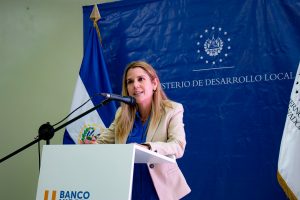Banco Hipotecario: Betting the Bank on Inclusion and Women

Celina Padilla Meardi, president of Banco Hipotecario de El Salvador
To speak about financial inclusion in El Salvador is to reference no more than a decade of work which has failed to give the country much of a boost.
But two years after the arrival of Nayib Bukele as president of the republic, El Salvador is improving the national approach to education and financial inclusion.
In 2019, Executive Decree No. 28 determined the creation, composition and responsibilities of the National Council for Inclusion and Financial Education (NCIFE), the governing body which will drive improvements.
The definition of financial inclusion by the NCIFE is “the access and use of a wide and diverse range of responsible, sustainable and quality financial products and services, both by individuals and companies. Mainly focused on solving problems of access and use for micro and small businesses, the population with lower incomes, women or traditionally excluded sectors”.
As a member of the NCIFE, Banco Hipotecario (BH) has been working to adapt services and products to improve the day-to-day lives of those Salvadorans excluded from the financial system. The first step was the creation of a credit policy to promote access to credit and to bring informal sectors of the economy into the banking system.
BH president Celina Padilla Meardi has taken important steps towards the transformation of the institution, establishing a new corporate culture based on values such as commitment, innovation, trust — and inclusion.
The aim is to ensure that all citizens can be banked, and to provide support for previously excluded sectors of society — with special emphasis on gender balance. Salvadoran women form a key part of economic and social development. At a national level, their roles and duties become more complex due to changes that are being implemented, and the economic independence that they are achieving.
The bank has designed a special credit line, Inclusión Mujer, with loans from $100 to $10,000 bearing soft requirements that allow easy access to funds, opening the doors to the true financial inclusion. It is designed for the needs of Salvadoran women, to start (or strengthen) a business via specialised advice from BH. Among the benefits is the possibility of providing the bank with simpler documentation as a credit reference, such as commercial invoices paid on-time. Various institutions issue suitable documents, including commercial houses, input suppliers, co-operatives, pawn shops and other established companies.
Some 10.1 percent of the total loan portfolio of Banco Hipotecario represents female sector finance. From April 2020 to May 2021, BH has provided around 900 credits (equivalent to $8.1m) in financing directed exclusively at financial inclusion through credit lines, ecological credit and special credit to companies in the tourism sector.
The Inclusión Mujer (Woman Inclusion) credit is a strategic bet by Banco Hipotecario to promote inter-institutional work with other government agencies that share this vision. These include the Ministry of Local Development and its Ciudad Mujer (City Woman) programme. Strategic communities in El Salvador have been visited — Ciudad Mujer in Santa Ana, San Miguel, San Martín in San Salvador and Citalá in Chalatenango — adding to the existing network of agencies with information about the credit line and how to apply for it.
This comes under under a framework of Mujer en Acción (Woman in Action), with other lines of specialised financing for women, such as the credit Vivienda Mujer (House for Women), Estudio Mujer (Study for Women) and complementary products such as exclusive insurance or training programmes for entrepreneurs.
Banco Hipotecario is actively working to contribute to the development of the economy by providing services and products in-line with societal needs.
It’s a good bet, and one likely to change the way of doing business in El Salvador.
You may have an interest in also reading…
Fortman Cline: Are Boutique Investment Banks Here to Stay?
The financial crisis of 2007 spawned a proliferation of boutique investment banks as larger institutions started laying-off staff and eliminating
Alexander Forbes Group: Three Strategies for Growth
Alexander Forbes Group Holdings Limited, a specialised financial services group headquartered in South Africa, successfully listed on the main board
LegalOne: Driving Innovation and Financial Inclusion for National Development
LegalOne Global Limited has established itself as a trusted authority in independent ratings and business intelligence, delivering rigorous research and























































































